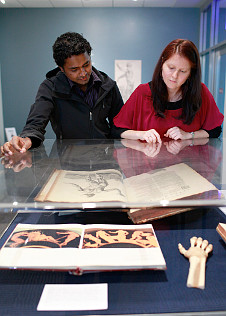Overview
The Centre for Health, Activity and, Rehabilitation Research (CHARR), School of Physiotherapy invites research abstracts from postgraduate students (PhD and Masters) for a Graduate Research Student Conference.
The Conference will be held on the 24th November 2014
Room 1.02, School of Physiotherapy, 10am - 4pm
The programme is open for any staff and/or students within the University. RSVP attendance by 21 th November
For further information please contact:
physio.research@otago.ac.nz
Programme
| 10am | Welcome and opening remarks | Dr Cath Smith (Associate Dean Graduate Research, School of Physiotherapy) |
| 10.15 | Keynote: Systematic reviews | Prof Suzanne McDonough (University of Ulster) |
| 11 am | Support the graduate research journey |
|
| 12-1 | Lunch | |
| 1- 1.20 | Blokes with strokes 'talk turkey' about participatory action research (PAR) | Ally Calder |
| 1.20 | Injury Survey of Belly Dancers in New Zealand | Siobhan Milner |
| 1.30 | Strength, balance, and self-reported falls in adults with idiopathic Parkinson's disease: a controlled observational study. | Kareem Diab |
| 1.50 | Menstrual pain and quality of life in women with primary dysmenorrhea: a protocol for the randomized controlled trial of effects of a treadmill-based exercise intervention | Priya Kannan |
| 2.00 | The effect of tram flap reconstructuion surgery on anticipatory postural adjustments | Daniela Aldabe |
| 2.20 - 2.50 | Afternoon tea | |
| 2.50 | Silicone Oil Study and Dupuytrens Surgery | Gail Donaldson |
| 3.10 | Effect of Combination Exercise Therapy on Walking Distance, Postural Balance, Fatigue and Quality of Life in Multiple Sclerosis Patients: A Clinical Trial Study | Bahram Sangelaji |
| 3.20 | The Efficacy of a Neck Strength Intervention in Professional Rugby Union Players | Danielle Salmon |
| 3.40 | STRICTA: is it the time to do more? | Lizhou Liu |
| 3.50 | Transverse Rectus Abdominis Myocutaneous (TRAM) flap breast reconstruction | Daniela Aldabe |
| 4.30 | CHARR Research Week Opening Event |
About the speakers
Prof Suzanne McDonough
Keynote: What makes a high quality systematic review?
Prof Suzanne McDonough will be presenting a keynote at the beginning of the conference. Suzanne is a William Evans Fellow for 2014.
Professor Suzanne Mc Donough is Professor of Health and Rehabilitation at the University of Ulster, N Ireland. She is a physiotherapist by background; was awarded her PhD in the area of neurophysiology in 1995 from University of Newcastle, UK; and a higher diploma in healthcare (Acupuncture) in 2002 from University College Dublin, Ireland.
Professor McDonough has published widely in her areas of expertise and has published several chapters on electrotherapy in key textbooks e.g. Electrotherapy: Evidence Based Practice (2008), and Animal Physiotherapy. Assessment, Treatment and Rehabilitation of Animals (2007). She has also recently published a chapter on acupuncture in Complementary Therapies for Physical Therapy. A Clinical Decision Making Approach published by Elsevier in 2008. She has obtained funding from a variety of prestigious external agencies and is currently completing several clinical trials on musculoskeletal pain, e.g. investigating the effects acupuncture as an adjunct to an exercise programme in people with low back pain in collaboration with Dr Park, University of North Carolina, USA. She is also part of a collaboration with the University of Otago, University of Umea and University College Dublin to explore the potential of accelerometers for the measurement of physical activity in people with musculoskeletal pain. Her research interests include electrotherapy/acupuncture and developing technologies used for musculoskeletal and neurological rehabilitation.
Professor McDonough has played a key role in helping to develop clinical research. She teaches clinical research techniques at undergraduate and postgraduate level and has supervised 15 PhD students to completion, 4 in the area of acupuncture/complementary and alternative medicine.
Prof Rachel Sproken-Smith
The PhD – is it out of alignment?
Rachel Spronken-Smith and Sharon Sharmini, University of Otago, New Zealand
Aspects of doctoral education have undergone substantial change in recent years, and we argue that as a result many PhDs programmes may be out of alignment. We draw on the concept of 'constructive alignment' (Biggs, 1999) who proposed that learning outcomes should be well aligned with teaching and learning methods and the assessment regime. The learning outcomes for doctoral candidates have expanded considerably in recent years in response to the desire to graduate candidates with a wider skill set, well equipped for a range of jobs beyond academia. Corresponding to this, in some programmes, the teaching and learning activities have altered, so rather than just doing a supervised project, candidates now often take workshops and courses to gain a broader skill set. However, the assessment has remained much the same, narrowly focussed on a written thesis and, in some cases, an oral defence. The rise of professional doctorates has allowed a rethinking of doctoral education. For example, the outcomes might include professional competency so the teaching methods involve professional practice and the assessment often uses a portfolio approach, allowing examiners to be assured candidates are meeting the various outcomes. Professional doctorate portfolios may include evidence of having met certain competencies (e.g. clinical), as well as leadership, project management, and communication in a range of modes etc. But where does this leave doctoral education for traditional PhDs? In this session we will discuss this issue to envision what doctoral education could look like and how alignment might be achieved.

CHARR, School of Physiotherapy PhD students, Stanley Winser and Alex Macznik, at the Reaching out: Celebrating 100 years of Physiotherapy Exhibition.